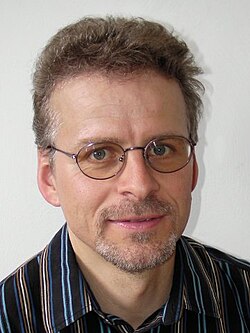
Summary
Marcus Hutter (nacido el 14 de abril de 1967 en Múnich) es un científico senior de DeepMind que investiga los fundamentos matemáticos de la inteligencia artificial general.[1] Está de licencia de su cátedra en la Facultad de Ingeniería y Ciencias de la Computación ANU de la Universidad Nacional de Australia en Canberra, Australia.[2] Hutter estudió física e informática en la Universidad Técnica de Munich.En 2000 se unió al grupo de Jürgen Schmidhuber en el Istituto Dalle Molle di Studi sull'Intelligenza Artificiale (Instituto Dalle Molle para la Investigación de Inteligencia Artificial) en Manno, Suiza.[cita requerida] Con otros, desarrolló una teoría matemática de la inteligencia artificial general.Su libro Universal Artificial Intelligence: Sequential Decisions Based on Algorithmic Probability fue publicado por Springer en 2005.[3]
| Marcus Hutter | ||
|---|---|---|
 | ||
| Información personal | ||
| Nacimiento |
1967 Múnich (Alemania Occidental) | |
| Nacionalidad | Alemana y australiana | |
| Educación | ||
| Educado en | ||
| Supervisor doctoral | Harald Fritzsch | |
| Información profesional | ||
| Ocupación | Informático teórico, profesor universitario, físico e investigador de la inteligencia artificial | |
| Área | Inteligencia artificial | |
| Empleador |
| |
| Sitio web | www.hutter1.net | |
Investigación
editarEn 2002, Hutter, con Jürgen Schmidhuber y Shane Legg, desarrollaron y publicaron una teoría matemática de la inteligencia artificial general, AIXI, basada en agentes inteligentes idealizados y aprendizaje reforzado motivado por recompensas.[4][5]: 399 En 2005, Hutter y Legg publicaron una prueba de inteligencia para dispositivos de inteligencia artificial.[6]En 2009, Hutter desarrolló y publicó la teoría del aprendizaje por refuerzo de funciones.[7]En 2014, Lattimore y Hutter publicaron una extensión asintóticamente óptima del agente AIXI.[8]
Premio Hutter
editarEn 2006, Hutter anunció el Premio Hutter a la compresión sin pérdidas del conocimiento humano, con un total de 50 000 € en premios.[9] En 2020, Hutter elevó el premio en metálico del Premio Hutter a 500.000 €.[10]
Obras publicadas
editar- Marcus Hutter (2002). «The Fastest and Shortest Algorithm for All Well-Defined Problems». International Journal of Foundations of Computer Science (World Scientific) 13 (3): 431-443. Bibcode:2002cs........6022H. arXiv:cs/0206022. doi:10.1142/S0129054102001199.
- Marcus Hutter (2005). Universal Artificial Intelligence: Sequential Decisions Based on Algorithmic Probability. Springer. ISBN 9783540221395.
Referencias
editar- ↑ [1]. DeepMind. Accessed February 2019.
- ↑ [2]. The Australian National University, Canberra. Accessed December 2016.
- ↑ Marcus Hutter (2005). Universal Artificial Intelligence: Sequential Decisions Based on Algorithmic Probability. Berlin; Heidelberg; New York: Springer.ISBN 9783540221395.
- ↑ Marcus Hutter (2002). «The Fastest and Shortest Algorithm for All Well-Defined Problems». International Journal of Foundations of Computer Science 13 (3): 431-443. Bibcode:2002cs........6022H. S2CID 5496821. arXiv:cs/0206022. doi:10.1142/S0129054102001199.
- ↑ Bill Hibbard (2008). Adversarial Sequence Prediction. In: Pei Wang (editor) (2008). Artificial General Intelligence, 2008: Proceedings of the First AGI Conference. IOS Press.ISBN 9781586038335.Pages 399–403
- ↑ Duncan Graham-Rowe (12 August 2005). IQ test for AI devices gets experts thinking. New Scientist.
- ↑ Marcus Hutter (2009). «Feature Reinforcement Learning: Part{I}: Unstructured{MDP}s». Journal of Artificial General Intelligence. ISSN 1946-0163.
- ↑ Tor Lattimore and Marcus Hutter (2014). «Bayesian Reinforcement Learning with Exploration». Algorithmic Learning Theory. Proc. 25th International Conf. on Algorithmic Learning Theory ({ALT'14}). Lecture Notes in Computer Science 8776. pp. 170-184. ISBN 978-3-319-11661-7. doi:10.1007/978-3-319-11662-4_13. hdl:1885/14709.
- ↑ Marcus Hutter. «50'000€ Prize for Compressing Human Knowledge». hutter1.net. Consultado el 29 de noviembre de 2016.
- ↑ Marcus Hutter. «500'000€ Prize for Compressing Human Knowledge». hutter1.net. Consultado el 25 de febrero de 2020.


